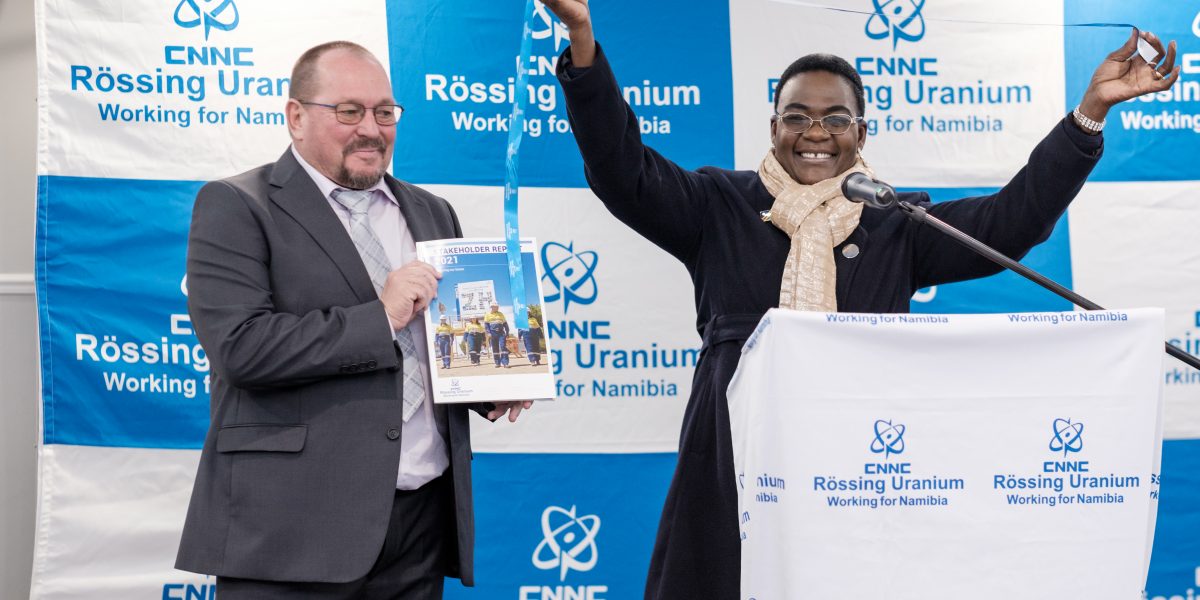Rössing Uranium officially launched its 2021 report to stakeholders, on 08 June 2022.
Speaking at the launch, Rössing Uranium’s managing director, Johan Coetzee said, the primary purpose of the annual stakeholder report is to communicate timely, reliable, and relevant information to inform and announce the company’s achievements and performance for the period under review.
He pointed out that Rössing Uranium again had an excellent year (2021) in terms of safety and production, and celebrated 45 years of operations.
“The company recorded an All-Injury Frequency Rate (AIFR) of 0.29, beating the record of 0.31 set in 2020, which is our best performance recorded in the history of the mine,” he said.
Johan further explained that the company exceeded budgeted production targets by a significant margin, as the 2,882 tonnes of U3O8 produced in 2021 represents a 16% increase compared to 2020. “To produce this product, we had to mine 20.7 million tonnes of rock and process 9.6 million tonnes of ore, ” he stated.
“We were able to achieve this excellent performance safely and efficiently through the commitment and hard work of our own employees, as well as the support from the contractors that are delivering services to us,” he said. At the end of December 2021, Rössing had a total of 943 permanent employees, 99% of them being Namibians.
The company boasts a 20% representation of women in its workforce, who are employed across all levels of the organization.
A total of N$930 million was spent on salaries and wages and a total of N$24.7 million on training of their employees, both internally and externally.
Johan noted that despite the sales volume being 11% higher than in 2020, revenue was 6% lower at N$4.26 billion due to the impact of a stronger Namibian dollar against the US dollar.
“In 2021, 76% sales volume was delivered to Asia, of which 90% has been sold to the majority shareholder CNUC/CNNC. The remaining 26% sales volume was delivered under the long-term contract portfolio to North America, Europe, the Middle East and Africa.”
As a major employer and purchaser of goods and services, Rössing Uranium made significant contribution to economic development in the Erongo Region in particular and to Namibia at large. Despite the prevailing market conditions and challenges posed by Covid-19 in 2021, Rössing’s total procurement expenditure amounted to N$3.01 billion, compared to the N$2.77billion in 2020.
“Rössing remains committed to supporting local suppliers, including spend on developing SMEs. As in previous years, most of the procurement expenditure was on local suppliers, amounting to N$2.25 billion or 75% of total procurement expenditure. 14% of the procurement spend went to South Africa, whilst the remaining 11% was spent internationally,” he said.
The review period also saw the mine continue to demonstrate its value to Namibia through contributions to the fiscal authorities. Rössing Uranium paid the Government N$111 million in royalty tax, and N$167 million as pay-as-you-earn tax on behalf of employees. No corporate tax dividends were paid in 2021.
Payments to public enterprises such as NamWater and NamPower amounted to N$464.2 million. This amount includes a total of N$8 million that was paid as the Vocational and Training levy.
Johan indicated that in 2021 Rössing Uranium invested about N$14 million in Namibian communities directly, and indirectly through contributions to the Rössing Foundation.
The Current Life of Mine for Rössing Uranium is 2026. With the support of the Board and Directors and shareholders the mine is working very hard to secure a long-term future and continued employment security for the mine and employees.
“In November 2020, the Board of Directors approved funds to complete a bankable feasibility study for extending the life-of-mine beyond 2026. This is underpinned by a north-eastern extension of our existing open pit, referred to as the Phase 4 pushback, which can provide sufficient ore to continue production for another 10+ years. Work on the LoME project is progressing well and the final report and recommendations will inform an investment decision by end 2022 or early 2023.”
“A major milestone for the LoME project was realised in July 2021, with the Ministry of Mines and Energy extending the validity period of our Mining license for 15 years to 2036.”
In parallel to the LoME project, Rössing Uranium continues to invest in and upgrade existing facilities on site to ensure the continued safe and efficient production of uranium oxide.
“A total of 48 major engineering projects were undertaken during 2021, the biggest being the construction of an additional 60,000m3 fresh water storage capacity at a cost of just over N$100 million. A total of N$204 million was invested in these 48 projects.”
In conclusion, Johan said the Rössing Uranium Board and its majority shareholder China National Uranium Cooperation (CNUC) have demonstrated their confidence in the Rössing Team to execute the business long-term strategy, with a commitment for increased technical support from CNUC.
“We are confident that we will do justice to this vote of support and look forward to continuing Rössing’s stated slogan of “Working for Namibia” for many years to come.”
Contributed by Rössing

